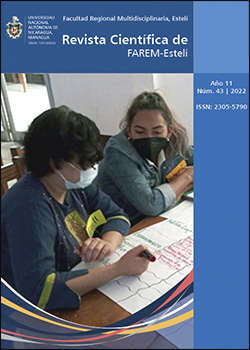Strategy for the pedagogical training of the tutor in the work entity. University of Holguín, Cuba
DOI:
https://doi.org/10.5377/farem.v11i43.15141Keywords:
Pedagogical training, strategy, tutor, work entityAbstract
Workers who work as tutors in labor entities (companies) manifest, in their performance, limitations to enhance the knowledge, skills and values necessary for students in the initial vocational training process developed in the educational level of Technical and Vocational Education. This is the premise for the implementation of actions that lead to their training. In order to solve this problem, a strategy was elaborated, which has as objective: To train from the pedagogical point of view the company tutor to achieve that they guarantee the integral formation of the workers and technicians in formation that are inserted in the labor contexts where they produce or provide determined services. This strategy as a result and practical contribution of the research consists of a general objective, specific objectives and strategic actions structured in four dimensions: Pedagogical, Didactic, Curricular and Technological, which allow the transformation of the tutors' performance.
Downloads
References
Abreu, R., Soler, J. (2014). Didáctica de la Educación Técnica y Profesional. Soporte digital. Universidad de Ciencias Pedagógicas para la Educación Técnica y Profesional “Héctor A. Pineda Zaldívar”. La Habana. Cuba
Addine Fernández, F. (2004). Didáctica: teoría y práctica. La Habana: Editorial. Pueblo y Educación.
Alonso, L. A., Cruz, M. A. & Ronquillo, L. E (2021). La formación profesional del trabajador. Ecuador. Editorial Libro Mundo.
Alonso, L. A, Cruz, M. A & Ronquillo, L. E. (2020). El proceso de enseñanza aprendizaje profesional. Ecuador: Editorial Mar y Trinchera.
Alonso, L. A. y cruz, M. A. (2020). Los tipos de aportes de la Tesis de Maestría en Pedagogía Profesional: La Estrategia. Material Base Orientador del Curso de Metodología de la Investigación Educativa. Departamento de Construcciones. FACING. Universidad de Holguín.
Augier, A. (1999). Dirección estratégica: una propuesta metodológica. Tesis en opción al grado académico de master en Educación. Holguín.
Campi, C., Saa, A., & Dicado, M. (2020). La educación profesional continua, la capacitación y el desarrollo laboral. RECIMUNDO, 4(3), 14-22. doi:10.26820/recimundo/4.(3).julio.2020.14-22. Disponible en: https://dialnet.unirioja.es
De Armas, N.; Lorences, J.; Perdomo, J. (2015). Caracterización y diseño de los resultados científicos como aportes de la investigación educativa. Documento en Soporte Digital. UCP “Félix Varela”. Villa Clara.
Parra, C. y Rodríguez, F. (2016). La capacitación y su efecto en la calidad dentro de las organizaciones. Revista Investigación, Desarrollo. Innovación. Vol. 6, No. 2 Enero - Junio 2016, 131 -143. ISSN: 2027-8306. Disponible en: https://dialnet.unirioja.es
Rodríguez, M. A. (2013). La estrategia como resultado científico de la investigación educativa. (Documento digital). Universidad de Ciencias Pedagógicas de Villa Clara. Cuba.
Wurgaft, J. (1998). La capacitación laboral en los países andinos. Lima, Perú: Organización Internacional del Trabajo
Valle Lima, A.D. (2012). La investigación pedagógica otra mirada: La Habana. Pueblo y Educación.
Published
Issue
Section
License
Copyright (c) 2022 Revista Científica de FAREM-Esteli

This work is licensed under a Creative Commons Attribution-NonCommercial-ShareAlike 4.0 International License.



